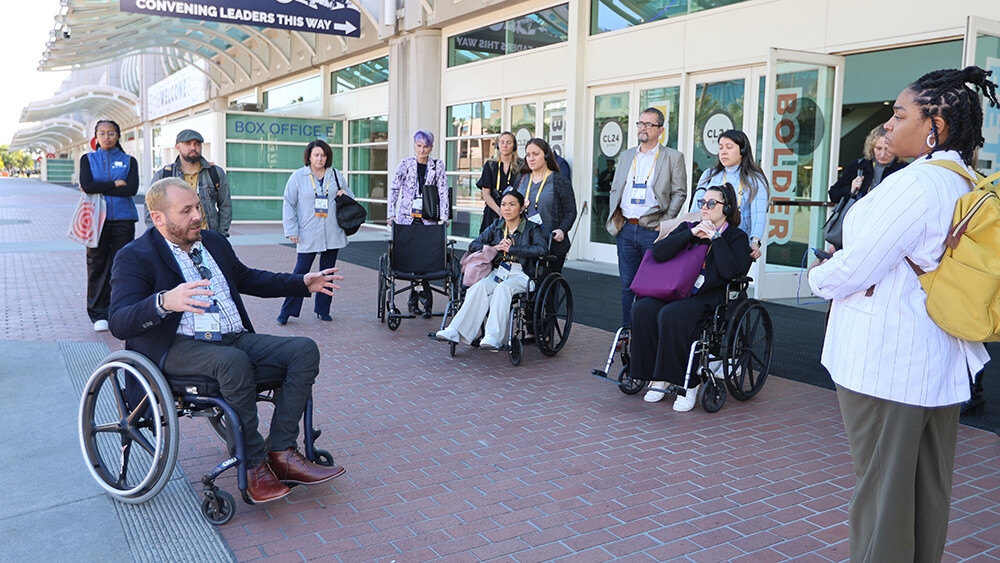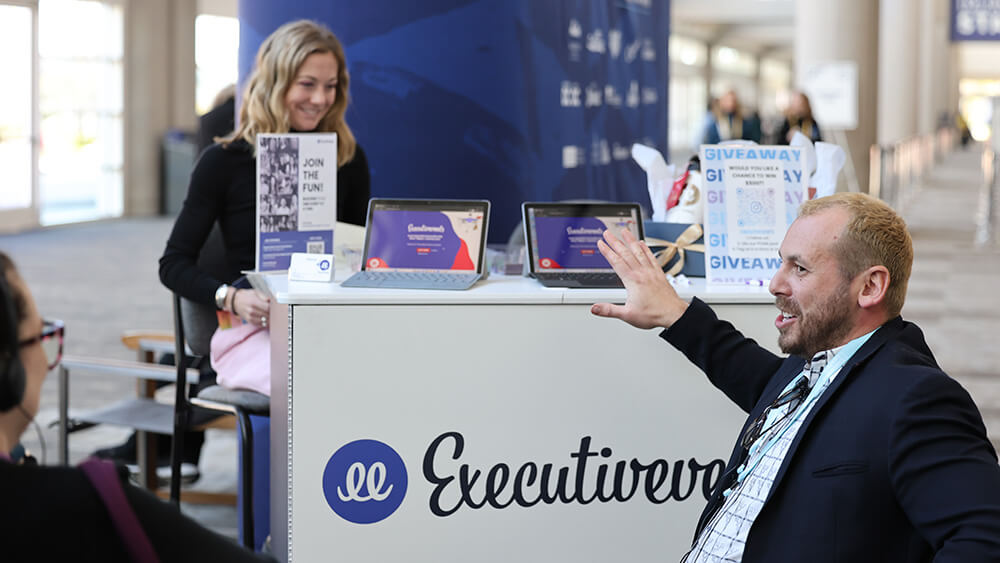
At PCMA Convening Leaders 20204 in San Diego, Ten Fifty Entertainment’s Austin Whitney led an immersive tour to show event professionals what makes an event or venue accessible when it comes to mobility needs. (Whatever Media Group)
When a car accident at 18 left Austin Whitney with a permanent spinal cord injury, the idea of living out the rest of his life in a wheelchair left him feeling “hopeless.”
“At that point in my life, I never knew anyone in a wheelchair. I just figured my life was kind of over,” Whitney said. But that outlook shifted when he went to his first music festival, just six months later. That experience, he said, “changed my life.”
A lifelong music lover who played in bands in high school, Whitney said festivals became his escape — even though navigating the venues in a wheelchair, often outside within temporary setups, was challenging. “My day-to-day life was pretty hard, so it was a place where I didn’t have to focus on that and I could just enjoy my favorite music.”
That led him to working in the music industry during college — odd jobs at venues and for artists like Jason Mraz. When a full-time job didn’t pan out, Whitney switched to plan b — law school. But it wasn’t long until he found his way back to music. During his first year of law school, Whitney jumped on an opportunity to create an accessibility compliance program from scratch for Lightning in a Bottle — a music festival held in Buena Vista Lake, CA, that, at the time drew around 10,000 people — in exchange for $1,000 and a few guest passes.
“This was 2013, so most major music events didn’t really have accessibility departments back then — certainly not the small ones,” Whitney said. “I thought, ‘oh, I think I can do this. I have experience with disability, I understand event production, and I am in law school. I should be able to figure this out.’”
It went well, Whitney said. So well, in fact, that he started receiving phone calls from other event producers in the industry. “It was like, ‘wow, I think there might be an opportunity here…if this is the response I’m getting from doing one show, there might be a need for this service that’s not being met.’”

“Just think about what’s the experience of someone in a wheelchair or someone [who is] deaf or blind or someone who has autism,” Austin Whitney said, “what is their experience like in the space?” (Whatever Media Group)
Making progress
Cut to present day more than 10 years later, Whitney is now widely regarded as the go-to expert for accessibility at live events, both in his role as president of Ten Fifty Entertainment, which provides accessibility consulting to an array of events from Coachella to the PGA Championship to LA Pride and many more; as well as founder and chairman of Accessible Festivals, a non-profit organization that seeks to improve access at live events for people with disabilities as well as raise awareness within the community, among other goals. When he’s not working on site as an ADA compliance director, he can often be found speaking about it — like at PCMA’s 2024 Convening Leaders in San Diego during the panel session “Beyond Inclusion: Charting the Path to Equitable Experiences in Events.”
In the 16 years since he attended that first music festival, Whitney says he has seen live events “change radically” when it comes to accessibility — an evolution he is proud to have played a role in. Back then, he said, events “weren’t accessible — just straight up. If you had a disability, you wouldn’t be able to engage with the space. You would not be able to get somewhere, you would not be able to see the show, probably wouldn’t be able to use the restroom.”
Today, that experience is very different. Every one of America’s top 100 grossing music festivals all have an accessibility compliance department, according to Whitney. And whereas years ago live events had only begun addressing the most basic of access needs — like eliminating stairs and offering accessible parking — today they’re going beyond the bare minimum, like offering sensory-friendly spaces for guests with Autism, for example.
Watching that progress firsthand, Whitney said, “that has been the joy of my work, of my career.”
But there’s always room for improvement.
When I asked Whitney where he still sees holes — specifically at business events and conferences, which he also frequently consults on — he’s quick to respond: the trade-show floor.
“Sponsorship activations are built by [and] designed by [a third party]…who may or may not follow the actual code,” said Whitney, who adds that he frequently ends up working with these designers one-on-one. He recommends that event organizers require sponsors and exhibitors to produce renderings ahead of time and share minimum build requirements to ensure booths and activations are also compliant with local codes.
More broadly, Whitney advises that organizers consider all of the components of an attendee’s event journey. “Just think about, what’s the experience of someone in a wheelchair or someone who is deaf or blind or someone who has autism, what is their experience like in the space?” he said. “How are they getting dropped off? How are they parking? What are the challenges that folks are going to face? Role play it.”
Jennifer N. Dienst is senior editor at Convene.
